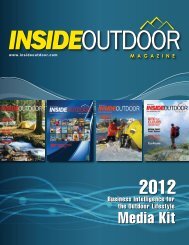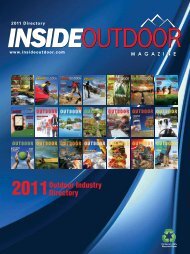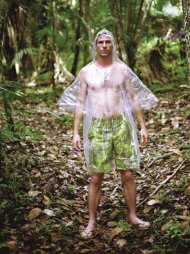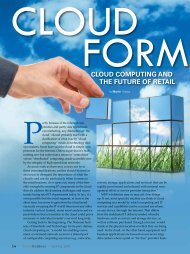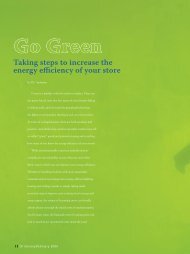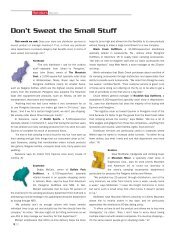Challenges of Green Design--Fall 2008
Challenges of Green Design--Fall 2008
Challenges of Green Design--Fall 2008
Create successful ePaper yourself
Turn your PDF publications into a flip-book with our unique Google optimized e-Paper software.
Top Five <strong>Challenges</strong> for Developing <strong>Green</strong> Products<br />
Challenge<br />
High expense associated with developing new technologies that are green or<br />
compliant<br />
43%<br />
Regulations differ widely according to regions and countries around the world 30%<br />
Difficulty measuring unconventional ROI on green products 25%<br />
Difficulty in understanding applicable regulations due to exemptions and<br />
shortages <strong>of</strong> knowledgeable employees<br />
24%<br />
<strong>Green</strong>er materials and technologies require new and large capital<br />
manufacturing investments<br />
24%<br />
Source: Aberdeen Group<br />
% <strong>of</strong> All Respondents<br />
DEALERS WANTED<br />
Top Five Pressures Driving <strong>Green</strong> Product Development<br />
Pressure<br />
Developing green products part <strong>of</strong> corporate social responsibility initiative 37%<br />
<strong>Green</strong> products <strong>of</strong>fer greater competitive product differentiation 35%<br />
Conscientious customers demand products that are more eco-friendly 28%<br />
Compliance to green related regulations required for market entry 26%<br />
Customers demand for products that use natural resources more efficiently 23%<br />
Source: Aberdeen Group<br />
% <strong>of</strong> All Respondents<br />
‘going green’ in their everyday life is simply<br />
not a big concern or a high priority,”<br />
says Smith.<br />
A mere 13 percent <strong>of</strong> those surveyed<br />
by Yankelovich, says Smith, are “strongly<br />
concerned” about the environment, while<br />
less than a quarter believe they can make<br />
a difference.<br />
And while Al Gore’s An Inconvenient<br />
Truth received widespread acclaim from<br />
the media and members <strong>of</strong> the scientific<br />
community, less than 20 percent <strong>of</strong> consumers<br />
saw the movie or read the book,<br />
say Yankelovich findings.<br />
Some may argue that the current economic<br />
crisis is distracting consumers from<br />
just about every other issue under the sun,<br />
including the environment. But no matter<br />
the reasons, such results already are raising<br />
questions about the potential bottomline<br />
benefits that can be derived from<br />
investing in socially responsible product<br />
development. Unless consumers begin to<br />
change their tune, one has to wonder how<br />
much patience American manufactures<br />
will show toward green investments outside<br />
<strong>of</strong> regulatory-driven necessities.<br />
Not that all hope is lost, by any means.<br />
In its sixth annual report on the carbon<br />
footprints <strong>of</strong> Global 500 companies, the<br />
Carbon Disclosure Project, a not-for-pr<strong>of</strong>it<br />
organization that acts as an intermediary<br />
between shareholders and corporations on<br />
climate change-related issues, argues that<br />
some companies confirmed billions <strong>of</strong> dollars<br />
in savings as a result <strong>of</strong> sustainability<br />
efforts in operations and packaging.<br />
Even within the seemingly pessimistic<br />
Yankelovich study, Smith makes the point<br />
that despite “most consumers’ lukewarm<br />
attitudes toward green,” companies that<br />
successfully convey the benefits <strong>of</strong> green<br />
attributes in a product can make those attributes<br />
a key feature in the buying decision<br />
<strong>of</strong> consumers who are just moderately<br />
concerned about climate change and the<br />
environment. That could include all but<br />
the 29 percent <strong>of</strong> consumers described by<br />
Yankelovich as “<strong>Green</strong>less,” or unmoved<br />
by environmental issues and alarms.<br />
Possibly most encouraging <strong>of</strong> all, Aberdeen<br />
researchers found a direct correlation<br />
between the length <strong>of</strong> time a company<br />
has been pursuing a green strategy and<br />
the level <strong>of</strong> success in generating a positive<br />
return from it. So companies that have<br />
had the opportunity to figure out what<br />
does and does not work well earlier than<br />
their manufacturer peers are dramatically<br />
more likely to hit launch dates, stick within<br />
budgets and minimize price increases.<br />
That seems to suggest that if manufacturers<br />
continue to push on, the premium<br />
price paid for greener products eventually<br />
goes away. And at that point, the need<br />
to change consumer behavior becomes<br />
much less <strong>of</strong> a factor.<br />
In the long term, eco-friendly product<br />
development could have a bright future.<br />
But that’s assuming manufacturers <strong>of</strong> all<br />
types can be persuaded to show patience,<br />
seeing how, in the nearer term, as we<br />
have said before, things likely get harder<br />
before they get easier.<br />
• Mulit-funtional gloves featuring •<br />
Thermolite ® Fibers<br />
• Keep you warm, even when wet •<br />
• Excellent P.O.P. display options •<br />
• MORE PROFIT PER PEG •<br />
Free<br />
sample pair for<br />
qualified dealers. Call us for<br />
more information<br />
800-426-8860<br />
atlasgloveconsumerproducts.com<br />
GO ANYWHERE • DO ANYTHING<br />
ATLAS® is a registered trademark <strong>of</strong><br />
SHOWA Glove Co. Thermolite® is a registered<br />
trademark for INVISTA certified performance<br />
fabrics containing proprietary INVISTA fibers.<br />
<strong>Fall</strong> <strong>2008</strong> | InsideOutdoor | 39




